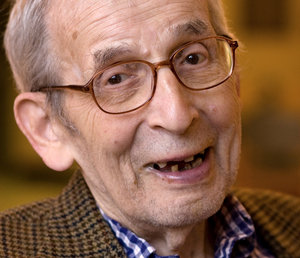 Standing before you is a grayhaired man wearing clothes that could have come from a garage sale.
Standing before you is a grayhaired man wearing clothes that could have come from a garage sale.
Even with the aid of a walker, his gate is unsteady. He has difficulty hearing and shouts to ask others to repeat themselves. His eyes are dull and cloudy behind his smudged glasses. His voice is coarse and weak from years of use.
This man is not your loved one, and you avoid eye contact; your gaze passes right by him. Maybe it’s because he appears uninteresting or maybe he reminds you of your own mortality.
Would it surprise you to learn this man was a decorated war hero or that he raised three children as a widower, or that he was the head of programming at NBC or an accomplished musician?
With all his wits about him, this man is feeling invisible, his identity all but forgotten. His aging looks, out-of-date clothes and failing senses now define him.
If this man does manage to get our ear, it’s no wonder he wants to share his past, the story of who he “was.” He wants to show us he was a contributor, that he made a difference. That he matters.
This invisibility is a tough road to travel when you’ve led a life of accomplishments, however small and/or personal they are.
George Washington, the father of our nation, died at 67, a ripe old age for a man living in the 18th century. I wonder how those who encountered him in his later years and did not know his history viewed him—as simply a weary old man?
We would all be better served as a society if we found more ways to uncover our elders’ history before it’s lost to the passage of time. They are called the Greatest Generation for a reason.
I recently asked my staff to write about their encounters with our clients, about those with cognitive impairment in our Adult Day Program and homebound seniors receiving Meals On Wheels, and about seniors coming for advice and counseling with our advocates or care managers.
Their stories were rich and powerful and amazing.
I was further reminded of this as I read the obituary of the stepparent of one of our staff and as I attended the funeral of a dear friend’s wife. Their stories made me yearn to know these people in a more personal way and to have the chance to tell them what incredible human beings they are, or were.
A few years ago I had the opportunity, via Story Corps, to archive the tale of an elderly couple my husband and I cared for up until their deaths. They had no children or close relatives and I wanted their story to live on somehow.
For my mother and father, we used an organization called Life Chronicles to videotape them with their children and grandchildren. They told their story for generations to come.
The point is we shouldn’t have to wait for funerals to hear some of the amazing stories of the people in our lives. We have the opportunity now to learn about them while they are still alive.
I have such respect for the Ombudsmen of Ventura County who visit seniors who are alone and living in a skilled nursing facility or residential care facility. And for the amazing Meals On Wheels volunteers who listen to the stories of homebound seniors when they bring their meals. You too can experience that richness.
Next time you’re sitting beside that old gray-haired man or woman at a coffee shop, restaurant or park, strike up a conversation. If they are willing to share, you will most likely learn something that will stick with you for the rest of your life.
And if they get to be heard, they will likely have an experience that will stick with them for the rest of theirs.